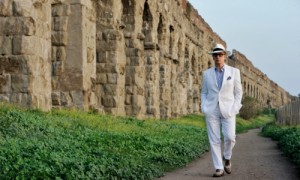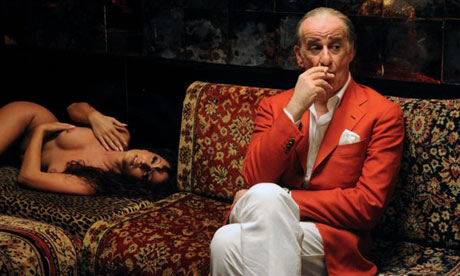 The rush as The Great Beauty begins leaves you breathless. The camera pans, quick and sharp, between people and statues; Roman culture is instantly evoked by those stony faces and pompous vistas. A fountain recalls Fellini’s La dolce vita. Before Pablo Sorrentino’s operatic film settles on its central figure, Jep Gambardella (urbane, animated Toni Servillo), it breathes through the simple presence of life in the city, whether precarious Japanese tourist or coked-up partygoer. There’s such vital energy to these moments, before Jep and the title appear, that encapsulates beauty and tragedy, the glorious and the grotesque. It’s a striking opening that the film doesn’t recapture, as it mellows into the intellectual and the peculiar instead.
The rush as The Great Beauty begins leaves you breathless. The camera pans, quick and sharp, between people and statues; Roman culture is instantly evoked by those stony faces and pompous vistas. A fountain recalls Fellini’s La dolce vita. Before Pablo Sorrentino’s operatic film settles on its central figure, Jep Gambardella (urbane, animated Toni Servillo), it breathes through the simple presence of life in the city, whether precarious Japanese tourist or coked-up partygoer. There’s such vital energy to these moments, before Jep and the title appear, that encapsulates beauty and tragedy, the glorious and the grotesque. It’s a striking opening that the film doesn’t recapture, as it mellows into the intellectual and the peculiar instead.
The party is Jep’s sixty-fifth birthday bash, and soon after it, he receives a visitor who makes the fatigued journalist re-evaluate his perspective. The upper-class hedonism, and the crafty mixture of judgment and participation from the camera – darting around, actors look into the camera, the audience part of the raucous party – recalls American cousins The Bling Ring and Spring Breakers, although the deeply masculine perspective of Sorrentino’s film often becomes toxic. Aside from Jep’s savvy female editor Dadina (Giovanna Vignola), the women are either decorative or condescending intellectuals whose opinions are diffused by Jep’s acerbic calm – or an elderly nun beyond all worldly description. Jep’s only real friends are men as fatigued by the emptiness of city life as he is – “Rome has really disappointed me,” laments one, surrounded by the imposingly beautiful architecture.
 The Great Beauty’s central relationship is between Jep and the city, whether that means its people, its buildings, its art, or the simple concept of the city itself. Dadina reveals that he’s “lazy” because he never leaves the city to see art elsewhere; Rome is a world closed off, a ring around the Vatican, as contradictorily uniform and complex as that papal enclosure. Jep is Berlusconi and the Pope at once. He holds the power of the critic, with all sorts of performance artists coming to him for plaudits and exposure. When a young girl is dragged outside to show off her talents for a decadent party, her tantrums throwing paint cans at a canvas smear into an ultimate beauty; when someone claims she’s being exploited, Jep insists that’s “Nonsense. That girl earns millions.” Roman life has become an abstract experience – even the statues are refracted across the centuries – driven by greed and selfishness. Jep is searching for the great beauty of the title; the picturesque nihilism of the piece seems to be that such an idealised thing can only ever be illusory.
The Great Beauty’s central relationship is between Jep and the city, whether that means its people, its buildings, its art, or the simple concept of the city itself. Dadina reveals that he’s “lazy” because he never leaves the city to see art elsewhere; Rome is a world closed off, a ring around the Vatican, as contradictorily uniform and complex as that papal enclosure. Jep is Berlusconi and the Pope at once. He holds the power of the critic, with all sorts of performance artists coming to him for plaudits and exposure. When a young girl is dragged outside to show off her talents for a decadent party, her tantrums throwing paint cans at a canvas smear into an ultimate beauty; when someone claims she’s being exploited, Jep insists that’s “Nonsense. That girl earns millions.” Roman life has become an abstract experience – even the statues are refracted across the centuries – driven by greed and selfishness. Jep is searching for the great beauty of the title; the picturesque nihilism of the piece seems to be that such an idealised thing can only ever be illusory.
Sorrentino’s visual sense is magnetic; The Great Beauty is a luscious experience, enjoying spinning through the decadence as much as it critiques it. But when art is acting as a reflective experience, it should probably reflect something fresh, and as sharp as the film’s imagery is, its blinkered, masculine gaze reveals nothing new about the world we experience. Steeped in intellectual reference points, whether literary or the cinematic ancestry refracted through modern tableaux, the central hollowness at the centre of The Great Beauty is at once its point and its undoing.
—
The Great Beauty is available on DVD and Blu-Ray from Artificial Eye now. Extras are the trailer and a 15 minutes behind-the-scenes featurette.




